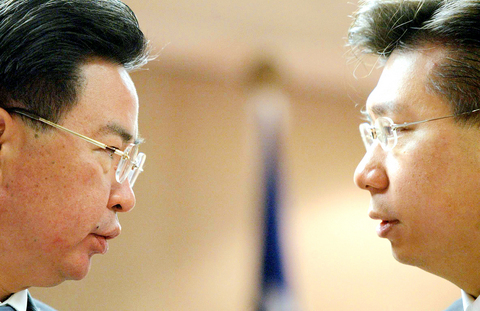The People First Party's (PFP) draft cross-strait peace bill and the Taiwan Solidarity Union's (TSU) draft anti-invasion peace bill passed a preliminary review at the legislature's Home and Nations Committee yesterday, but most of the bills' articles were put aside because of sharp differences of opinion.
The parties agreed to talks to address differences on the contentious articles before sending them to the plenary legislative session for second and third readings.
The TSU's 11-article anti-invasion peace bill states that Taiwan has existed alongside China since the founding of the People's Republic of China, and that any change to the status quo or any action to strip the nation of its sovereignty would not be tolerated by Taiwanese or the international community.

PHOTO: LIN CHENG-KUN, TAIPEI TIMES
The draft also says that the government should call a referendum and amend the Constitution to safeguard Taiwan's sovereignty if the cross-strait status quo is threatened. The government could also use "non-peaceful" means to resist China's annexation, the draft states.
The PFP argued that it was not necessary to enact the law because existing legislation has similar provisions. It also said that the use of the word "Taiwan" rather than the official national title in the bill was bound to cause confusion and controversy.
But they praised the TSU's patriotism and its attempt to enact the law.
The Democratic Progressive Party (DPP) proposed an additional paragraph to the bill, which stated that the government must obtain more weapons for the sake of national security.
Calling the PFP's proposed negotiation committee in its cross-strait peace bill a "monster," TSU Legislator David Huang (
"It clearly encroaches on the president's constitutional authority to set cross-strait policy as well as the executive authority of the Mainland Affairs Council," Huang said. "I'd very much like to know what they plan to do when the president's decision clashes with those made by the council."
DPP Legislator Huang Chao-hui (
Chang Hsien-yao (張顯耀), the head of the PFP policy research department, however, said that establishing the council was necessary because the Mainland Affairs Council and its "white glove," the Straits Exchange Foundation, were no longer competent to handle cross-strait affairs.
According to the bill, a 17-member council must be established and several "peace ambassadors" must be elected among council members to conduct cross-strait negotiations and address 11 cross-strait policy issues.
They include signing an agreement about direct transportation links, the establishment of a demilitarized zone, the inking of an accord to protect China-based Taiwanese businesspeople, the setting up of a cross-strait free trade zone, the holding of a cross-strait summit and the signing of a peace accord with China.
Decisions arrived at by council members and "peace ambassadors" would be legally binding, and council members would be appointed by political parties in proportion to representation in the legislature.

The manufacture of the remaining 28 M1A2T Abrams tanks Taiwan purchased from the US has recently been completed, and they are expected to be delivered within the next one to two months, a source said yesterday. The Ministry of National Defense is arranging cargo ships to transport the tanks to Taiwan as soon as possible, said the source, who is familiar with the matter. The estimated arrival time ranges from late this month to early next month, the source said. The 28 Abrams tanks make up the third and final batch of a total of 108 tanks, valued at about NT$40.5 billion

Travel agencies in Taiwan are working to secure alternative flights for travelers bound for New Zealand for the Lunar New Year holiday, as Air New Zealand workers are set to strike next week. The airline said that it has confirmed that the planned industrial action by its international wide-body cabin crew would go ahead on Thursday and Friday next week. While the Auckland-based carrier pledged to take reasonable measures to mitigate the impact of the workers’ strike, an Air New Zealand flight arriving at Taipei from Auckland on Thursday and another flight departing from Taipei for Auckland on Saturday would have to

A group from the Taiwanese Designers in Australia association yesterday represented Taiwan at the Midsumma Pride March in Melbourne. The march, held in the St. Kilda suburb, is the city’s largest LGBTQIA+ parade and the flagship event of the annual Midsumma Festival. It attracted more than 45,000 spectators who supported the 400 groups and 10,000 marchers that participated this year, the association said. Taiwanese Designers said they organized a team to march for Taiwan this year, joining politicians, government agencies, professionals and community organizations in showing support for LGBTQIA+ people and diverse communities. As the first country in Asia to legalize same-sex

MOTIVES QUESTIONED The PLA considers Xi’s policies toward Taiwan to be driven by personal considerations rather than military assessment, the Epoch Times reports Chinese President Xi Jinping’s (習近平) latest purge of the Chinese People’s Liberation Army (PLA) leadership might have been prompted by the military’s opposition to plans of invading Taiwan, the Epoch Times said. The Chinese military opposes waging war against Taiwan by a large consensus, putting it at odds with Xi’s vision, the Falun Gong-affiliated daily said in a report on Thursday, citing anonymous sources with insight into the PLA’s inner workings. The opposition is not the opinion of a few generals, but a widely shared view among the PLA cadre, the Epoch Times cited them as saying. “Chinese forces know full well that